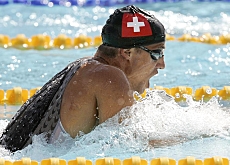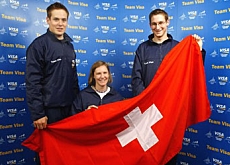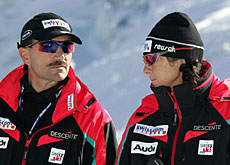Sport runs into cash crisis

The Swiss Olympic Association is warning that it may have to scrap funding for a number of sports because of a lack of money.
Its president Walter Kägi says the extent of the problem is so severe that future Swiss participation in certain events at the Olympic Games is under threat.
The Swiss Olympic Association painted a bleak financial picture for the future of sport in Switzerland at a recent press conference in Lausanne.
Kägi told swissinfo that the country was failing to punch its weight at international level and the situation was unlikely to improve without an injection of funds.
According to Kägi, the association’s budget has effectively been frozen for the past couple of years despite an increase on paper of SFr8 million.
He explained that the bulk of these extra millions were ring-fenced for the promotion of various health and drug-prevention campaigns and could not be spent on training elite athletes.
“If funding remains at the current level, we won’t be able to support every sport and we will have to choose which ones have the best chance of succeeding internationally,” Kägi told swissinfo.
“However, I can’t say which sports we would leave to their own destiny. We haven’t discussed this until now and it’s politically very sensitive.”
Streamlined system
He pointed out that other countries such as Norway, Austria and the Netherlands had already moved to a more streamlined structure for sports funding and were now reaping the rewards.
“We see that these countries have reached a high level in certain disciplines,” he added. “We could also achieve a similar level if we stop funding a wide range of sports and target fewer disciplines in a more efficient way.”
In 2003 Swiss Olympic shared SFr14.28 million among the country’s sports federations. The amount a federation receives is based on results, development of young talent and its importance both nationally and internationally.
The classification system was reviewed recently, with the big winners being beach volleyball, orienteering, triathlon and men’s artistic gymnastics, which all saw their funding increased by up to 15 per cent. The big losers were athletics, swimming and canoeing.
Swiss Olympic says it is examining various ways of increasing its budget, from attracting more sponsorship through to asking for a bigger contribution from the national lotteries.
The association receives SFr18.5 million or two-thirds of its annual budget from the lotteries, with the contribution fixed at a rate of SFr3 per person.
Kägi would like to see this figure increased to SFr3.20 or even SFr3.50, and he plans to open discussions on this with the country’s regional authorities.
Shortage of sponsors
With the government fixed on reducing public spending, he says the only other option is to find new sponsors.
Last month credit-card firm Visa announced that it would support three Swiss Olympic hopefuls – a move welcomed by Kägi. But he said it was becoming ever more difficult to attract new sponsors.
“The sponsorship sector in Switzerland is extremely tight,” said Kägi. “The globalisation of ‘Swiss’ firms and increased competition for funds in a shrinking home market means there is less money to go around the national sports federations. Skiing is suffering just as much as the Swiss Olympic Association.”
The Swiss Ski Federation is indeed feeling the pinch and has a SFr1.8 million hole in its budget for next season. It says this is due to the extra costs incurred by funding new disciplines such as snowboarding, biathlon and telemark, and the fact that it is short of a major sponsor.
The cash crunch could hardly have come at a worse time for the country’s alpine skiers who recorded their worst winter season since 1966, failing to win a single World Cup race.
Downhill budget
With the Winter Olympics in Turin just ten months away, the women’s and men’s alpine teams will have to stage a revival on reduced resources. According to the NZZ am Sonntag newspaper, they will receive SFr600,000 less next year.
Marc Wälti, spokesman for the federation, declined to confirm this figure but he did say that the team would have to make do with fewer coaches. The team’s summer training camp in the Andes is also likely to be cancelled to save money.
“The women are probably not going to Argentina and it is uncertain whether the men are going,” Wälti told swissinfo.
“We can do the training on the glaciers of Zermatt and Saas-Fee but, of course, the conditions are different.”
Wälti stressed, however, that the federation’s budget for next year – around SFr23 million – was still high when compared with other ski federations around the world.
“We will be ready for next season and Turin, too,” he added. “In sport, money does not guarantee you success.”
swissinfo, Adam Beaumont
The Swiss Olympic Association says it needs more money to improve the country’s medal-count at major championships.
It claims that Swiss participation in certain events at the Olympic Games and at various world championships is at risk unless the financial situation improves.
The Swiss Ski Federation has announced that it is SFr1.8 million short for next season.

In compliance with the JTI standards
More: SWI swissinfo.ch certified by the Journalism Trust Initiative


You can find an overview of ongoing debates with our journalists here. Please join us!
If you want to start a conversation about a topic raised in this article or want to report factual errors, email us at english@swissinfo.ch.